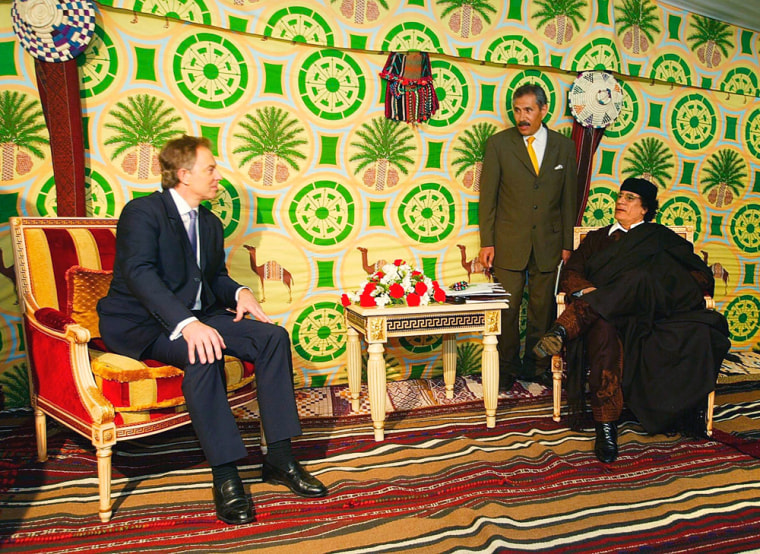In a state visit that marks Britain's willingness to welcome Libya back into the international community, British Prime Minister Tony Blair met with Libyan leader Moammar Gadhafi on Thursday, saying that the two shared a common goal in defeating the al-Qaida terrorist network.
After historic talks with the Libyan leader, Blair said Gaddafi recognized “a common cause with us in the fight against al-Qaida, extremism and terrorism, which threatens not just the Western world but the Arab world also.”
“We are showing by our engagement with Libya today that it is possible for countries in the Arab world to work with the United States and the U.K. to defeat the common enemy of extremist fanatical terrorism driven by al-Qaida", Blair said, "and to ensure we have a more secure world because of the absence of weapons of mass destruction.”
“I think it is a very, very important signal for the whole of the Arab world,” Blair added.
Blair promised not to forget “the pain of past actions,” such as the 1988 Lockerbie bombing by Libyan agents, which killed 270 people. But he added that Libya should be welcomed back into the international fold.
“In reaching out the hand of partnership today, we do not forget the past,” Blair said. “But we do try in the light of the genuine changes happening to move beyond it.”
Red carpet, ceremonial tent
Britain has taken the diplomatic lead in ending Libya’s international isolation, and Blair’s visit — the first by a British leader since Gadhafi seized power in 1969 — is Gadhafi’s reward for dismantling his nuclear weapons program and renouncing terrorism.
Blair received a red-carpet welcome from his Libyan counterpart Shukri Ghanim and the foreign minister, Abdel-Rahman Shalqam, after his chartered British Airways jet touched down at Tripoli’s Matiga military airport. He passed through the honor guard before his motorcade headed off for a desert tent on the outskirts of Tripoli where he was to meet with Gadhafi.
Some in Britain have criticized the country’s strengthening ties with the state long considered a pariah. But Blair said countries that cooperate with the international community should be welcomed back into the fold.
“Of course there’s always a risk,” Blair said Wednesday in Lisbon, Portugal. “But I think it’s important to take the risk, if by doing so we can show that as well as being able and willing to take action against states that defy international order, that also if countries are prepared to come back into compliance with the international community, then we are able to extend the hand of friendship.”
Blair has lauded Gadhafi’s swift progress in dismantling his chemical, nuclear and biological weapons programs, and the British leader holds up Libya as an example of successful diplomacy.
“I believe in dealing with these issues in whatever way we can,” Blair said at a news conference in Lisbon. “When we have to take action, we take action. Where we can by diplomacy and negotiation bring people to a more sensible strategy for the future, let us also do that.”
History of grievances
Britain has a history of grievances with Gadhafi, who supplied shiploads of weapons to the Irish Republican Army in the 1980s.
Britain broke off diplomatic relations with Libya in 1984 after British policewoman Yvonne Fletcher was killed by a shot fired from a window of the Libyan embassy, or “people’s bureau,” in London.
Relations hit bottom after Libya was implicated in the bombing of a Pam Am jetliner over Lockerbie, Scotland.
The two countries restored diplomatic relations in 1999 after Libya accepted responsibility for Fletcher’s shooting, apologized and agreed to pay her family compensation.
Foreign Secretary Jack Straw said Thursday that British detectives would visit Libya on April 3 as part of the investigation into Fletcher’s death. No one has been charged with her killing.
Gadhafi’s government also has taken responsibility for the Lockerbie bombing and agreed to compensate relatives of the victims, a move that resulted in the lifting of U.N. sanctions against Libya.
Relations also have improved between the United States and Libya. In the highest-level meeting in decades, a U.S. envoy gave Gadhafi a letter from President Bush on Tuesday commending Libya’s progress in eliminating weapons of mass destruction.
Washington remains skeptical
However, Washington remains more skeptical than London about Libya’s progress. U.S. officials say Libya must further improve its human rights record and end support for terrorism before Washington restores diplomatic relations and removing wide-ranging sanctions.
British companies, including Royal Dutch/Shell and British Aerospace, already are looking for business in Libya, British officials said.
Blair’s official spokesman said Thursday that Shell was preparing to sign a $200 million deal for gas exploration rights off the coast of Libya.
Without providing specific details, Blair’s official spokesman told reporters en route to Tripoli that the deal, to be signed in Libya later Thursday, was potentially worth $1 billion.
Blair aides said Libya could expect cooperation with its defense needs and Britain would, in time, push for an European Union arms embargo to be lifted. Libyan officers may be invited to train in Britain, as Gadhafi himself did as a junior army officer in 1966.
Since Libya announced in December that it would scrap its weapons of mass destruction, it has shipped hundreds of tons of equipment associated with its nuclear program to the United States and is allowing international inspectors to destroy or secure chemical stockpiles.
